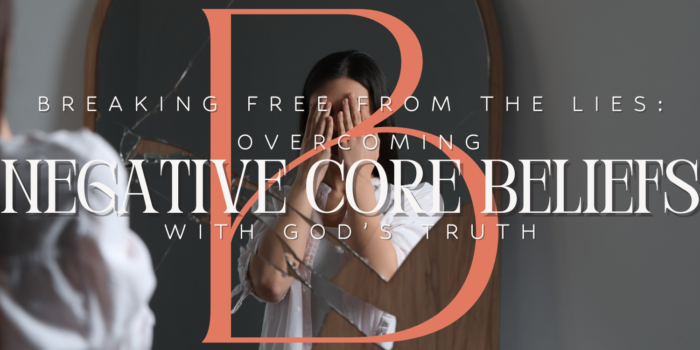Breaking Free from the Lies: Overcoming Negative Core Beliefs with God’s Truth

Have you ever found yourself stuck in a mental loop, replaying the same hurtful thoughts over and over again? It’s not just the day-to-day struggles that weigh us down—often, it’s those deep, negative core beliefs that keep us feeling lost or inadequate. These lies about ourselves sneak into our minds, whether through painful experiences, comparison to others, or the pressures of cultural expectations. They become the scripts we live by, shaping not only how we see ourselves; but also affecting how we approach our relationships, our dreams, and even our faith, keeping us from living the full, abundant life God has for us.
But here’s the good news: those lies don’t define you. God’s truth does. In this post, we’ll take a closer look at some of the most common negative core beliefs and explore how to replace them with the life-giving truth of who God says you are.
What Are Negative Core Beliefs?
Negative core beliefs are deeply ingrained, often unconscious thoughts about ourselves that shape the way we see the world and our place in it. These beliefs usually develop over time as a result of painful experiences, rejection, failure, or comparison to others, and they often get reinforced by the messages we absorb from cultural expectations, society, or our own internal dialogue.
At their core, these beliefs are lies—false identities that we unknowingly cling to, allowing them to influence our self-worth, our relationships, and even our faith. They manifest in thoughts like, “I’m not good enough,” “I’ll never be loved,” or “I’m a failure.” While these thoughts may not always be front and center in our minds, they quietly influence our actions, decisions, and how we engage with the world.
The problem with negative core beliefs is that they distort the truth of who we really are, especially as children of God. They act like chains, holding us back from living out the full, abundant life God intends for us. Instead of walking confidently in the identity that God has given us, we end up stuck in cycles of fear, shame, or self-doubt, allowing these lies to direct our steps.
However, the power of these negative beliefs can be broken. By identifying them and replacing them with the truth of who we are in Christ, we can begin to live in freedom and purpose, grounded in the love and grace of God rather than the false narratives we’ve carried.
The problem with negative core beliefs is that they distort the truth of who we really are, especially as children of God.
Common Negative Core Beliefs (The Lies We Believe)
Now that we understand what negative core beliefs are, let’s look at some common lies that many women find themselves believing, often without even realizing it. As you read through, take a moment to reflect. Do any of these resonate with you?
- I am unloveable.
- I am unworthy.
- I am not good enough.
- I am a failure.
- I am stupid.
- I am weak.
- I don’t matter.
- I’ll never measure up.
- I am alone.
- I am broken beyond repair.
- I am not beautiful.
These negative beliefs might not always be at the forefront of our minds, but they often linger in our thoughts, shaping how we view ourselves and how we interact with the world. The enemy uses these lies to keep us from living in the fullness of our identity in Christ.

How to Identify Negative Core Beliefs
Identifying negative core beliefs is a crucial step toward breaking free from their grip and embracing the truth of who you are in Christ. These beliefs often operate beneath the surface, subtly influencing your thoughts, feelings, and actions without you even realizing it. So, how do you bring these hidden lies into the light? Here are some practical steps to help you uncover and identify the negative core beliefs that may be holding you back:
Pay Attention to Your Self-Talk
Begin by listening to the internal dialogue that runs through your mind, especially during challenging situations. Do you notice thoughts like, “I’m not good enough,” “I always mess things up,” or “No one cares about me”? These recurring thoughts can reveal underlying beliefs about yourself.
Journal Your Thoughts and Emotions
Keeping a journal can be a powerful tool for self-discovery. Write down your thoughts and feelings regularly, particularly when you’re experiencing strong emotions like sadness, anger, or anxiety. Look for patterns or recurring themes in what you write. These patterns can point to deeper beliefs that are influencing your emotional responses.
Reflect on Past Experiences
Consider significant events in your life that may have shaped how you view yourself. Painful experiences, failures, or critical comments from others can plant seeds of negative beliefs. Reflecting on these moments can help you understand where certain thoughts and feelings originated.
Identify Triggers
Notice what situations or interactions trigger negative thoughts about yourself. Is it when you’re around certain people, facing specific challenges, or stepping out of your comfort zone? Identifying triggers can help you pinpoint the beliefs that are activated in those moments.
Ask Yourself Probing Questions
Challenge your thoughts by asking questions like:
What evidence do I have that this belief is true?
Is there another way to interpret this situation?
Would I say these things to a friend facing the same circumstances?
These questions can help you critically examine and question the validity of your beliefs.
Seek Feedback from Trusted Individuals
Sometimes, those close to us can see patterns that we miss. Talk to trusted friends, family members, or mentors about the struggles you’re facing. They can offer insights or perspectives that help you see yourself more clearly.
Pray for Insight and Revelation
Invite God into the process. Pray and ask Him to reveal any lies you’ve been believing about yourself. The Holy Spirit can illuminate areas of your heart and mind that need healing and truth.
Look for Repetitive Behaviors
Pay attention to habits or behaviors that may be rooted in negative beliefs. For example, consistently avoiding social situations might stem from a belief that you are unworthy of others’ time or friendship.
Notice Emotional Reactions
Strong emotional reactions can be indicators of deeper issues. If certain comments or situations elicit an intense response, consider what belief might be fueling that emotion.
Consider Professional Guidance
If you’re finding it difficult to identify or work through these beliefs on your own, seeking help from a Christian counselor or coach can be beneficial. They can provide tools and strategies to help you uncover and address deep-seated beliefs.
Remember, identifying negative core beliefs is not about self-condemnation but about self-awareness and healing. It’s an opportunity to bring hidden lies into the light where they can be confronted and replaced with truth. As you embark on this journey, be patient and compassionate with yourself. It’s a process, and every step you take brings you closer to the freedom and wholeness that God desires for you.
Once you’ve identified these negative beliefs, you can actively work on replacing them with God’s truth, reshaping your identity based on His unchanging Word rather than the shifting sands of past experiences or cultural expectations. This transformative process allows you to live more fully in the confidence and joy of who you are in Christ.

Replacing the Lies with God’s Truth
For each of these negative core beliefs, the Bible has a counter-truth that is grounded in God’s unchanging Word. Let’s break down these lies and replace them with the truth of who God says you are.
Lie: I am unloveable.
Truth: You are deeply loved by God. “But God demonstrates his own love for us in this: While we were still sinners, Christ died for us” (Romans 5:8). God’s love for you is not based on your actions or how lovable you feel—it is a free gift given through Jesus, proving His boundless love for you.
Lie: I am unworthy.
Truth: You are worthy because of Christ. “You are precious and honored in my sight, and because I love you” (Isaiah 43:4). Your worth does not come from what you do or don’t do; it comes from God, who calls you precious and honored.
Lie: I am not good enough.
Truth: You are fearfully and wonderfully made. “I praise you because I am fearfully and wonderfully made; your works are wonderful, I know that full well” (Psalm 139:14). You are God’s masterpiece, uniquely created with purpose and intention. You don’t need to measure up to anyone else’s standards because God created you exactly as He intended.
You are God’s masterpiece, uniquely created with purpose and intention.
Lie: I am a failure.
Truth: You are more than a conqueror. “No, in all these things we are more than conquerors through him who loved us” (Romans 8:37). Even when you fail, you are still victorious in Christ. He works through your weaknesses and failures to bring about His plans.
Lie: I am stupid.
Truth: You have the mind of Christ. “But we have the mind of Christ” (1 Corinthians 2:16). God gives you wisdom, and through His Spirit, you can understand spiritual truths that the world cannot. You are not defined by worldly intelligence but by divine understanding.
Lie: I am weak.
Truth: God’s power is made perfect in your weakness. “My grace is sufficient for you, for my power is made perfect in weakness” (2 Corinthians 12:9). You don’t need to be strong in your own strength because God’s power is at work in you, especially when you feel weak.
Lie: I don’t matter.
Truth: You are chosen and dearly loved. “But you are a chosen people, a royal priesthood, a holy nation, God’s special possession” (1 Peter 2:9). You are not an accident or insignificant. God has chosen you as His special possession and loves you dearly.
Lie: I’ll never measure up.
Truth: You are complete in Christ. “For in Christ all the fullness of the Deity lives in bodily form, and in Christ you have been brought to fullness” (Colossians 2:9-10). You don’t need to measure up to worldly standards because, in Christ, you are already complete.
Lie: I am alone.
Truth: God will never leave you. “Never will I leave you; never will I forsake you” (Hebrews 13:5). Even when you feel alone, God is always with you, guiding, comforting, and walking beside you through every trial.
Lie: I am broken beyond repair.
Truth: You are made new in Christ. “Therefore, if anyone is in Christ, the new creation has come: The old has gone, the new is here!” (2 Corinthians 5:17). No matter how broken or shattered you may feel, God has made you new through Christ’s redeeming power.
Lie: I am not beautiful.
Truth: You are God’s masterpiece. “For we are God’s masterpiece. He has created us anew in Christ Jesus, so we can do the good things he planned for us long ago” (Ephesians 2:10 NLT). Your beauty isn’t defined by the world’s standards but by the fact that you are God’s handiwork, created in His image.

Practical Tips to Surround Yourself with Truth
Now that you’ve identified the lies and replaced them with the truth, the next step is to surround yourself with constant reminders of who you are in Christ. It’s easy to forget these truths when the world and its pressures are constantly bombarding you. Here are some practical ways to keep God’s truth at the forefront of your mind:
Scripture Cards
Write down key verses that counter the lies you’ve been believing and place them where you can see them daily—on your bathroom mirror, refrigerator, car dashboard, or at your desk. For example, if you struggle with feeling unworthy, put Isaiah 43:4 somewhere visible to remind yourself that God calls you precious and honored.
Affirmation Journal
Keep a journal where you write down daily affirmations based on scripture. Each morning, start your day by writing and reflecting on a truth about your identity in Christ. For instance, “Today, I am loved and chosen by God” (1 Peter 2:9). This practice helps anchor you in God’s truth before the day’s challenges come.
Set Alarms with Truth
Set phone alarms with short, powerful reminders throughout the day. For instance, at 9 AM, your alarm might say, “You are fearfully and wonderfully made” (Psalm 139:14), and at noon, “You are complete in Christ” (Colossians 2:9-10). This can be a gentle nudge to refocus your thoughts when the day gets overwhelming.
Find an Accountability Partner
Share your journey with a trusted friend or loved one who can hold you accountable. Let them know the lies you’re battling and the truth you’re trying to live out. They can encourage you with scripture, check in on how you’re doing, and help you stay grounded in God’s truth.
Incorporate Worship into Your Routine
Fill your home, car, and workspace with worship music that declares God’s truth. Worship is a powerful way to realign your heart with who God says you are. Songs rooted in scripture will remind you of His promises, even on days when you struggle to believe them.
Create a Truth Wall
Designate a space in your home where you can post encouraging scriptures, quotes, or reminders of your identity in Christ. This “truth wall” could be in your bedroom, office, or any place where you need to refocus your mind. Seeing these truths daily will help reinforce them in your heart.
Prayer and Meditation
Spend intentional time in prayer and meditation, asking God to renew your mind and help you see yourself through His eyes. Meditate on scriptures that speak to your worth in Christ, allowing God’s truth to take root deeply in your heart.
These small, intentional practices will help rewire your thinking and keep God’s truth at the forefront of your mind, especially when life’s challenges try to pull you back into old patterns. By consistently applying these steps, you’ll start to notice a shift in how you see yourself and interact with the world—rooted not in lies but in the unshakable truth of who God says you are.
Conclusion:
The battle against negative core beliefs is not one you have to fight alone. With every lie you uncover and replace with God’s truth, you’re stepping into the freedom He has for you. But staying grounded in that truth takes intentionality—especially when the pressures of life try to pull you back into old patterns. Surround yourself with scripture, with reminders of who you truly are in Christ, and don’t hesitate to lean on others for support. Remember, you are not defined by the lies you’ve believed; you are defined by the love and truth of God. Let that truth shape your life and bring you into the joy and fullness He has promised.
You don’t have to carry these burdens on your own anymore. Today, take that first step toward reclaiming your identity and living in the freedom God has already given you.

What are some negative thoughts or beliefs that have been recurring in your life?
Take time to reflect on moments when you’ve felt inadequate or unworthy. What thoughts seem to come up the most, and how have they impacted your actions or feelings?
How do these negative beliefs affect your relationship with God and others?
Reflect on how your core beliefs have shaped how you interact with the people around you and how you see your relationship with God.
Which truths from God’s Word counter the lies you’ve believed?
Identify specific scriptures that speak directly to the lies you’ve been believing. How can you apply these truths to your life moving forward?
What practical steps can you take this week to remind yourself of the truth of who you are in Christ?
Consider which of the practical tips (scripture cards, journaling, worship, etc.) resonate with you, and create a plan to incorporate them into your routine.




